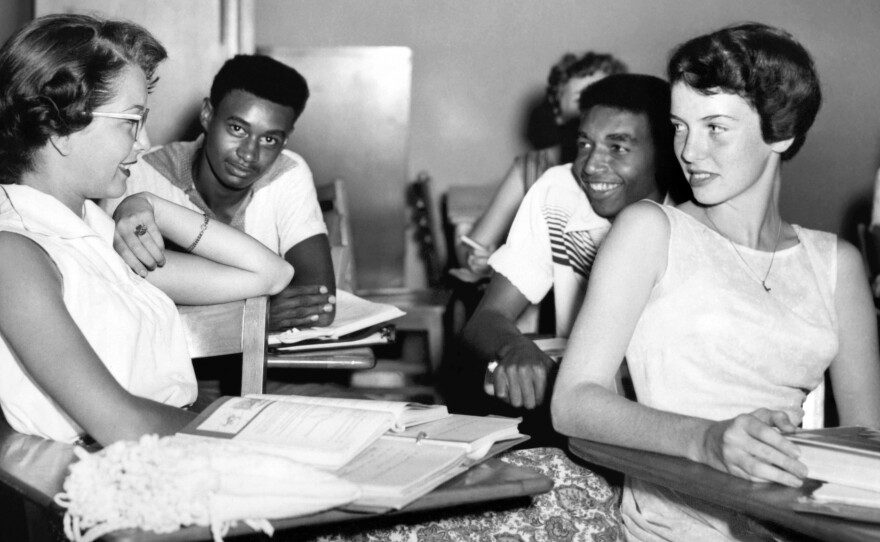They were hailed as the first Black students to integrate public schools in Tennessee, in 1955. But until recently, the brave acts of the students, known as the Oak Ridge 85, were relatively forgotten. That started to change last year – and now the local school board is moving to add the history of the Oak Ridge 85 to its classrooms' curriculum.
"This is a part of our history in our school's history that is so important, but it has also been put in the shadows," Kirk Renegar, the principal of Robertsville Middle School in Oak Ridge, tells local TV station WBIR.
"Today almost no one in America knows about this landmark Civil Rights achievement," the city council said last year, in a proclamation honoring the Oak Ridge 85.
The Black students enrolled in Oak Ridge's previously whites-only schools in 1955, just one year after the Supreme Court declared segregated public schools to be unconstitutional in its landmark Brown v. Board of Education decision. But the integration push in Oak Ridge didn't trigger the public furor or sensation of other early efforts, because unlike in Clinton, Tenn., or Little Rock, Ark., the move to educate children of different races alongside each other didn't involve a legal battle.
In 1955, Oak Ridge was managed by the Atomic Energy Commission, which later became the U.S. Department of Energy. That sets it apart from Clinton, which "may be more prominent because it was the first state-run public school to be desegregated as a result of Brown v. Board," Joe Pagetta of the Tennessee State Museum said on Tuesday.
Oak Ridge was under federal control because of its original status as a "secret city" – a built-to-order community that was the home of the U.S. government's Manhattan Project. That cleared the way for administrators to simply announce in early 1955 that, in accordance with the Supreme Court's decision, up to 100 students would move from their school in Scarboro, the city's Black community, to Oak Ridge High School and Robertsville Junior High. The community's federal leadership had already been planning to end segregation because of a presidential executive order to integrate schools on all military posts.
When it arrived, the federal mandate for Oak Ridge came with three basic requirements: students wouldn't be favored or discriminated against because of their skin color; school district boundaries would be followed without regard to race; and teachers and other personnel would be hired based on merit rather than their skin color.
But until now, public school students in Oak Ridge were more likely to learn about landmark desegregation victories elsewhere in the South — the Clinton 12 or Little Rock 9, for instance — than the dozens of Black students who broke their own city's color barrier before those other achievements. Recognition has grown in the past year, as the city marked the 65-year anniversary of starting to desegregate schools.
The 85 students "showed amazing courage and resolve," the city council said, noting that they "experienced racial epithets on the school buildings, negative statements, stinging indignity, some fistfights, as well as the stress of having to attend classes where they were only they were the only Black students."
Despite those problems, the council's proclamation states, "the overall desegregation went smoothly and quietly, thanks to the great courage of the students, their parents, teachers and school administrators, as well as great overall community support and wonderful civil rights leadership from the Department of Energy and the National Nuclear Security Administration."
Former student Archie Lee, who was one of the Oak Ridge 85, recalled in an oral history project how his strong grades, particularly in math, won him recognition by the National Honor Society. He also told of the many reminders that despite his school being integrated, discrimination was still alive and well in the U.S.
"I was taking physics, and the physics and chemistry class went to Huntsville, Alabama, to some missile facility there," Lee said. "I was the only Black one on the bus. Coming back we stopped at a restaurant. Everybody got off, went into the restaurant, everyone sat down at the table along with me, and they came over and told us they wouldn't serve me. Everybody said, 'Well if you won't serve him, you won't serve us,' so we left that restaurant. They all got up and walked out, and we went somewhere else."
In addition to the city council's proclamation, the story of the Oak Ridge 85's anniversary last year became the subject of a documentary for WBIR, titled "The Secret in Scarboro."
"Teachers are showing this now. It gives you goosebumps, quite frankly," Renegar told the station. "It has made a huge difference for our community and our school system, of bringing the story of these heroes to the forefront."
More plans are in the works. School officials say they want Oak Ridge's story to be part of the state's social studies curriculum. And this week, current students of Oak Ridge High School plan to interview 10 members of the Scarboro 85, to get a better sense of their experiences. A recording of that interview will then be shared online.
"Oak Ridge High School has expressed that the story of the Scarboro 85 cannot be shared enough and should be broadcasted for others to hear," the school said as it announced that plan.
Copyright 2021 NPR. To see more, visit https://www.npr.org.






